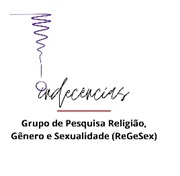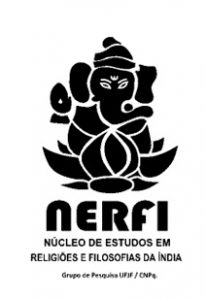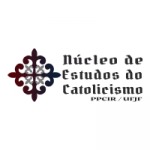Research Groups
The research activities and promotion of knowledge at PPCIR are organized especially through the Research Groups. Get to know them and participate in our groups and their activities.
- African and Afro-Brazilian Religions Research Group
Leader: Robert Daibert Jr.; Vice-leader: Sônia Regina Corrêa Lages - RENATURA
Leader: Clodomir Barros de Andrade; Vice-leader: Oscar Federico Bauchwitz - NERELPSI – Religion and Psyche Study Group
Leader: Dr. Sidnei Vilmar Noé; Vice-leader: Dr.ª Tatiene Ciribelli Santos Almeida - indedencies – Religion, Gender and Sexuality (ReGeSex) Group
Leader: André S. Musskopf; Vice-leader: Ana Ester Pádua Freire - Catholicim Research Group – NEC
Leader: Rodrigo Portella; Vice-leader: Emerson Sena - Evangelical, Power and Politics in Latin America Study Group – NEPPAL
Leader: Paulo Barrera Rivera - Protestantisms and Theologies Research Group (NEPROTES)
Leader: Arnaldo Erico Huff Júnior; Vice-leader: Edson Fernando de Almeida - MÚLTIPLOS – Research Group in Plurality and Religion
Leader: Maria Cecília Simões - Religions and Philosphies in India Research Group (NERFI)
Leader: Dilip LoundoStudy - Study Group in Theory of Religion (ETER)
Leader: Prof. Dr. Frederico Pieper
___________________
African and Afro-Brazilian Religions Research Group
Leader: Robert Daibert Jr.; Vice-leader: Sônia Regina Corrêa Lages
The goal African and Afro-Brazilian Religions Research Group is to accomplish studies and produce new academic knowledges in Brazil and the Americas in the contemporary religious field. Combined, the investigations on the understanding of those two religious
universes are interested both in their constitution (rituals, mythologies, cosmologies, traditions, beliefs, oralities, memoires, identities) as well as in their relations with society, age groups, culture, literature, art, history, and heritage. The studies include also researches that relate the African and/or Afro-Brazilian religious traditions to issues of gender, race and social class and themes such as: colonization, slavery, abolitionism, abolition, post-abolition, black scholars, racism, homophobia, religious intolerance, citizenship, health, ecology and subaltnerized knowldges.
Link to CPNPq Research Groups
Directory dgp.cnpq.br/dgp/espelhogrupo/5221702548498368
___________________
RENATURA

Leader: Clodomir Barros de Andrade; Vice-leader: Oscar Federico Bauchwitz The research group RENATURA exists since 2018, and its goal is to study the polyhedric relations between Religions and Natures, emphasizing the transdisciplinary dialogue with other areas of the Humanities, traditional Sciences and Knowledges. At this moment, researchers from four institutions participate in RENATURA
(Universidade Federal de Juiz de Fora, Universidade Federal Fluminense, Universidade Federal do Rio Grande do Norte and Universidade Estadual do Norte Fluminenese, putting together dialogical efforts and experiences which have been materialized
consistently in research, teaching and promotion with excellency (see @RENATURA.UFJF, in You Tube, RENATURA promotion channel), besides the book
ANDRADE, Clodomir B. (org.) Natureza e Sagrado: olhares. Juiz de Fora: Editora
Universidade Federal de Juiz de Fora, 2023.
Link to CPNPq Research Groups
Directory: https://dgp.cnpq.br/dgp/espelhogrupo/496777
Social media: @renaturaufjf – RENATURA GRUPO DE PESQUISA UFJF – YouTube
___________________
NERELPSI – Religion and Psyche Study Group
Leader: Dr. Sidnei Vilmar Noé; Vice-leader: Dr.ª Tatiene Ciribelli Santos Almeida
The group understands itself to be a space for the development of research projects that relate the search for knowledge on religion (Religious Studies) with the search for the knowledge about the human psyche (Psychology), through the knowledge called Psychology of Religion. It implies a reciprocal relation, where the focus can privilege both the aspects concerning the repercussion on the human psyche of elements of religion, as well as, in a inverse sense, the influence of factors of the humans psyche on religion. The history of the academic study of this relation, even after more than a century, from the research of the pioneers, W. James in the North American context, and
W. Wundt, in the German, is still incipient in Brazil. This is an opportunity for the commenting of researches that, at the same time, in which claim the accumulatedscientific legacy of different European and North American traditions, focus on the development of a bias of its own turned to the richness of the Brazilian religious phenomenon. It means, therefore, to foster researches with interdisciplinary character, which, while accomplishing a discussion about the conceptual and substantive aspects that relate the study of religion with the human psyche and vice-versa, asking for the pertinence of those for the analysis of the multifaceted religious manifestations in
Brazil. Besides the presentation and discussions of research projects in the group, it also works on the study of transversal themes, which cross the different research projects developed by the group’s members and also the study of reference authors and works in
the field. Not the least, the research group fosters the participation of its members, through exchange programs or participation in events, both at national and international level, in activities that promote the reception of the accomplished research in other centers of reference in the field and that allow, on the other hand, the dissemination of the research developed at PPCIR/UFJF.
Link to CPNPq Research Groups
Directory: http://dgp.cnpq.br/dgp/espelhogrupo/40380
https://www2.ufjf.br/ppcir/pesquisa/linhas-de-pesquisa/
______________________________
indecencies – Religion, Gender and Sexuality (ReGeSex) Research Group

Leader: André S. Musskopf; Vice-leader: Ana Ester Pádua Freire
The Research Group indecencies holds periodical meetings for the construction and discussion of individual or collective research projects connected to the Religious Studies Graduate Program – PPCIR/UFJF. The meetings are, preferably, in person, being open to use hybrid methodology to facilitate the participation of members and guests from outside the Program. For each year the Group chooses one theme for deepening, developing processes of study and practical activities that may include the organization of academic events, extensionist actions, social, cultural and political interventions. Besides, from the studies and practical activities it fosters the technical and intellectual production, particularly in the publication of results in the form of rticles, chapters, books and didactic and paradidactic materials, offering spaces for writing and collective and creative production.
Link to CPNPq Research Groups Directory: dgp.cnpq.br/dgp/espelhogrupo/800464
_________________________________
Evangelical, Power and Politics in Latin America Study Group – NEPPAL
Leader: Paulo Barrera Rivera
Studies the recent phenomenon of evangelical conservatism, its political and in politics repercussions in Latin American and its strategies to reproduce their own “habitus”. It creates conditions for the exchange of knowledge on the theme, on national and international levels and in comparative perspective. It fosters the debate about its members ongoing research projects, both in internal activities and in the participation of conferences. It welcomes undergraduate and graduate researchers whose research themes are aligned with NEPPAL. It promotes the knowledge produced in the form of articles, book chapters and books. It maintains contact with social movements and
actors of civil society seeking the exchange of knowledges and the interaction between academy and society.
Link to CPNPq Research Groups
Directory: http://dgp.cnpq.br/dgp/espelhogrupo/9064775634467376
______________________________
MÚLTIPLOS – Research Group in Plurality and Religion

Leader: Maria Cecília Simões
Múltiplos, Research Group in Plurality and Religion, acts gathering and promoting experiences of researchers in the area of Religious Studies and correlated areas that seek widen and widening approaches and perspectives about plurality and religion. We think
of plurality as a mark of the religious experience, highlighting in our researches the interstitial and border spaces of the experience through sensitive approaches to syncretisms, hybridisms, ambiguities, crossroads, webs and networks of meaning. We understand the emphasis on difference and in the multiplicity as a took for the visibility of subaltern groups and discourses and for the corresponding questioning of religion’s hegemonic and homogenizing logics. Múltiplos is connected the the Graduate Program of Religious Studies at the Federal University of Juiz de Fora and is part of a wide interinstitutional network of research in the Area od Religious Studies and Theology, through the its participation in the Working Groups “Contemporary spiritualities, religious plurality and dialogue” (Anptecre/Soter).
Compreendemos a ênfase na diferença e na multiplicidade como ferramenta para a visibilidade de grupos e discursos subalternos e para o decorrente questionamento de lógicas hegemônicas e homogeneizadoras da religião. O Múltiplos está ligado ao Programa de Pós-graduação em Ciência da Religião da Universidade Federal de Juiz de Fora e faz parte de uma ampla rede interinstitucional de pesquisa na área de Ciências da Religião e Teologia, através de sua integração ao GT "Espiritualidades contemporâneas, pluralidade religiosa e diálogo" (Anptecre/Soter).
Link to CPNPq Research Groups
Directory: dgp.cnpq.br/dgp/espelhogrupo/8826800062488930
Instagram: @multiplos.gp
____________________________
Protestantisms and Theologies Research Group (NEPROTES)

Leader: Arnaldo Erico Huff Júnior; Vice-leader: Edson Fernando de Almeida
Created in 2011, the Protestantisms and Theologies Research Group (NEPROTES), acted during 10 years around sociohistorical studies of Protestantism, Pentecostalism and ecumenism. In 2022, NEPROTES, was restructured, considering its protagonism in the creation of the Rubem Alves International Society (SIRA, 2018), in partnership with the Rubem Alvez Institute, and getting together with GERA-Jequitibás (Study Group on Rubem Alves). Since then, it has three research lines: epistemology of religion; religion, ethics and politics; religion and art. The proposal is to think the protestantisms and the theologies mainly in the horizon of Rubem Alvez and the interpretative tradition that he represents. Among other activities, the group has recently been leading the organization
of SIRA’a international symposiums, with meaningful results in terms of publications.
Link to CPNPq Research Groups Directory:
http://dgp.cnpq.br/dgp/espelhogrupo/190017
Social Media:
https://www.instagram.com/gera.jequitibas/
_________________________________________
Religions and Philosphies in India Research Group (NERFI)

Leader: Dilip Loundo
The Religions and Philosophies in India Research Group (NERFI) is a Research Group officially registered in CNPq since 2010. It is part of the Graduate Program in Religious Studies (PPCIR) at the Federal University of Juiz de For a (UFJF). NERFI’ main goal is
to contribute to the consolidation of the studies about India in the Brazilian academy through the promotion of initiatives that lead to the systematic investigation of the plurality of religious and philosophical traditions that developed in the Indian subcontinent over more than four thousand years. NERFI’s activities include, on one hand, (i) the study of ritual and devotional practices, mythological narratives, morality systems, and artistic productions; and, on the other hand, (ii) the reflection around the metaphysical, ontological, logic, ethic an aesthetic principles that characterize the philosophical speculation, of cognitive and soteriological character, of the mais schools
of thought, viz., viz., Vedānta, Sāṃkhya, Nyāya, Vaiśeṣika, Yoga, Mīmāṃsā, Jainismo, Budismo, Cārvāka and Vyākaraṇa.
Link to CPNPq Research Groups Directory
https://dgp.cnpq.br/dgp/espelhogrupo/618466
Social Media
https://www.youtube.com/@NERFI-UFJF
https://www2.ufjf.br/nerfi/
Group of Studies in Catholicism – NEC

The Catholic field, since (at least) the XIX century, has been constantly marked by tensions between agents and institutions defending traditional practices and those open to the transformation in line with Modernity. Starting from this evidence the project seeks the study of Catholicism in its different forms of expression and tendencies in the public sphere, as well as an internal elan, mostly in relation to the different forms of permanence and rupture demonstrated in its representations and practices. Among the many possibilities of approaching the theme, issues that guide de research are: religion, power and politics; religion and laity; religious festivities, devotions and peregrinations; religious agents communication means and cultural industry; salvation and magic; therapeutical practices and youth; ecospirituality; theological conflicts internal to the institution(s) of the Church; theological and symbolic representations of Catholicism; liturgies and forms of worship expressions. Although the focus of the project is on the frame that privileges the temporal space of historic Modernity, projects that go back to temporal and cultural spaces prior to Modernity are also absorbed by this research project.
Link CNPq’ directory: https://dgp.cnpq.br/dgp/espelhogrupo/576246
Site: https://estudoscatolicismo.wixsite.com/website
Event: https://www.even3.com.br/estudosdocatolicismo2022/
Simposium: https://www.pucgoias.edu.br/eventos/iii-simposio-internacional-de-estudos-do-catolicismo/
———————————————————————
Study Group in Theory of Religion (ETER)
Leader: Prof. Dr. Frederico Pieper
The Study Group in Theory of Religion (ETER) is dedicated to the debate and study of theories about religion, gathering professors, researchers, former students and current students interested in this theme. The goals of this project can be tied together in two lines of action: Phenomenological- Hermeneutical. Investigates how phenomenology (on religion or philosophical) and hermeneutical
thinkers can help to interpret religion. In order to accomplish that, primary texts of those thinkers are studied, always questioning about their contributions to the understanding of religion, in their epistemological formulations as well as in their normative proposals of religion. In a hermeneutical approximation and that seeks other sources to think about the theme, visual cultural manifestations
(mainly cinema) and their contributions to think religion are also studied; Epistemology of Religious Studies. This line is invested in research about the historical and systematic aspects of the constitutions of the Area of Religious Studies and contemporary debates about the theme. Thinking about religion does not mean only investigating the conceptualizations of religion, but also the epistemological elements that support certain approximations to the theme. What are the specific contours of this area and what are the consequences to the understanding of religion? What are the specific contributions of Religious Studies to the understanding of the religious phenomenon? Since this is theoretical research, the methodology used is based fundamentally in bibliographical research and, in the case of studies related to the contribution of visual culture to the theories of religions, in the analysis of the cinematic language.
Link to CNPq’ Directory: http://dgp.cnpq.br/dgp/espelhogrupo/775020
